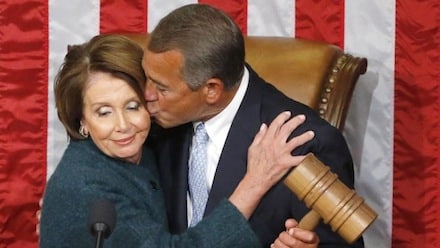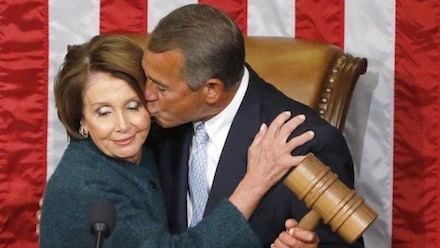US Speaker of the House John Boehner (R-OH) is like the fellow you ask over for dinner time and again who always has a reason to decline the invitation. He says, in turn, that he has to work late, has to deal with a family emergency, needs to feed the neighbor’s cat, and is too tired. The excuses pile up, and you finally get the message: The guy won’t come over, but he lacks the backbone to just say “no.”
For nearly a year, Boehner has been proclaiming his desire for the House to debate and vote on the Islamic State (ISIS) War that the executive branch has been pursuing. But, instead of scheduling a vote, something the House Republican leadership does regularly for all kinds of legislation, Boehner keeps coming up with new excuses for letting the war proceed without any House consideration.
The responsibility for inaction resides with Boehner and the House Republican leadership. They could have put a declaration of war, or just an authorization for use of military force (AUMF), on the House floor anytime on their own. To insist, as Boehner has repeatedly during the ongoing US military action in Iraq and Syrai, that the House can only work from a proposed AUMF from President Barack Obama is just a way to duck responsibility.
Boehner proclaimed on May 19 his newest excuse for blocking a House debate and vote on the war. Boehner now says the proposed AUMF legislation for the ISIS War that President Barack Obama sent to the House over three months ago is not quite right. Therefore, Boehner says, Obama should start over, writing a new proposed AUMF and sending that to the House. Boehner returned to the matter in a Tuesday press conference in which he complained that the proposed AUMF Obama sent to Congress in February is not “a robust authorization that will allow the president to use the tools at his command to actually go out and fight and win this war.”
Boehner’s critique of Obama’s proposed AUMF does not even square with reality. Boehner is criticizing Obama’s proposed AUMF as too weak. However, Obama’s proposed AUMF that has been sitting in the House since February is actually so broad and elastic that it allows for extensive worldwide US military action, including fighting by US ground troops, irrespective of nebulous assurances of restraint contained in the proposed AUMF.
Further, Boehner had his opportunity to advise Obama regarding what should be in a proposed AUMF and refused to do so. Asked in a December 4 press conference if Obama should include “American troops on the ground leading that fight” in a proposed AUMF, Boehner answers, “I’m not going to speculate on what the president should suggest to the Congress in terms of what that authorization should look like.”
Hold on a minute there. Boehner is actually saying that, while Obama’s proposed AUMF from February is not right and the president should send the House a new proposed AUMF that is right, Boehner will not say what should be in a proposed AUMF to make sure it is right.
Unless Obama can read Boehner’s mind, Boehner’s request for a new proposed AUMF is an invitation for months more of continued House inaction. Reviewing some of Boehner’s previous statements and deeds regarding House consideration of the ISIS War it is hard to conclude otherwise than that the House Republican leadership desires such inaction.
The reality is that Boehner has been playing a game with the ISIS War authorization issue all along. While Boehner talks big, the last thing he has wanted to do is have a debate and vote on the House floor.
In a January 21 press conference Boehner declared that Obama sending the House a proposed AUMF would lead, “surely” by the spring of this year, to the House completing hearings, as well as holding a floor debate and vote. On February 11, Obama sent the House his proposed AUMF. Yet, nothing is happening; House Republican leadership continues to block a House floor debate and vote on the ISIS War. Spring ends June 21. Tick tock.
Four months earlier, Boehner had expressed an even more urgent desire to take action on an AUMF. In September, he told George Stephanopoulos in an ABC interview that Boehner would bring the House back from recess to consider an AUMF should Obama propose one. Yet, once Obama did in February offer a proposed AUMF, there was no follow-through in the House. Since Obama offered a proposed AUMF, over three months have passed — including five recesses totaling six weeks. After all this time, the only action Boehner can muster is to send the proposed AUMF back to the president for a redo.
A Wednesday press release from Rep. Walter Jones (R-NC), who has been publicly hounding Boehner for months to just schedule a vote, relates the frustrating way that Boehner says he wants to hold a debate and vote on the ISIS War yet continues to block any debate and vote. Jones’ press release notes:
On September 25, 2014, Speaker Boehner told The New York Times that he wanted to wait until 2015 to bring an AUMF to the House floor for a debate and a vote to avoid bringing it up during a lame duck session. On December 6, 2014, Speaker Boehner said that House Republicans would work with the president to get an AUMF request approved if the president sent one to Congress. On February 11, 2015, President Obama sent his AUMF request to Congress. In over three months, the House has failed to act on the president’s request, or any alternative.
The press release from Jones, a Ron Paul Institute for Peace and Prosperity Advisory Board member, proceeds to chronicle some of the many actions, all fruitless, taken by Jones and other House members to bring about of a full debate and vote in the House regarding the ISIS War:
On February 6, 2015 in anticipation of President Obama sending an AUMF request to Congress, Congressman Jones and Congressman McGovern sent a letter to Speaker Boehner urging him to schedule a full debate on the president’s AUMF request.
On February 23, 2015, Congressman Jones led a coalition urging Speaker Boehner to follow regular order on President Obama’s AUMF request so that the House could make changes to it and have an open debate and a vote on it.
Last September, when the president started conducting airstrikes against ISIS and arming Syrian rebels, Congressman Jones sent a letter to Speaker Boehner asking for a full debate on an authorization for the use of military force in the region.
Last July, Congressman Jones introduced H. Con. Res. 105 to prohibit the deployment of U.S. armed forces in a sustained combat role in Iraq without congressional authorization. The resolution passed with 370 votes.
Last August, Congressman Jones, Congressman McGovern, and Congresswoman Lee formed a bipartisan coalition to urge the House Foreign Relations Committee to draft an authorization regarding Iraq and Syria. They also urged Speaker Boehner to bring up the authorization for a debate and a vote before Congress recessed at the end of September.
That list is just a beginning. Unmentioned in the list, for example, is that the House Republican leadership in May prevented consideration of House members’ amendments to the National Defense Authorization Act (NDAA) that would have brought to the House floor at least some debate and a vote related to the ISIS War.
Back in a May 1 C-SPAN interview, Rep James McGovern (D-MA) succinctly pinned blame on Congress members for ducking their responsibility regarding the ISIS War:
Congress is basically abrogating its responsibility. And you can’t have it both ways. You can’t sit back and criticize the president for committing troops into another war in Iraq and in Syria, but then say: ‘But I don’t want to do my job. I don’t want to vote yes or no on it.’ It’s too easy for congress to just kind of stand back and let it all happen, because, if it goes bad you can say ‘I told you it was going to go bad’ and if it goes good you can say ‘well, I was with them all the way.’
Boehner is Exhibit A in this two-faced abrogation of responsibility.


